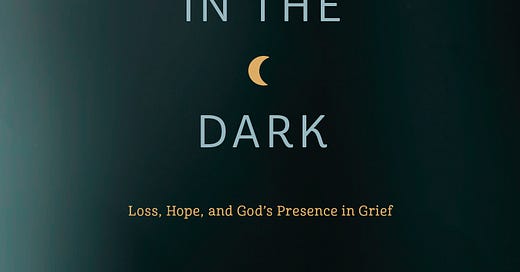How to Hold Onto Hope After Loss—Q&A with Aubrey Sampson
the latest book you'll want to add to your library + an excerpt
One of the strange gifts of grief is meeting others who get it—people who understand what it is to bear up under the weight of life post-loss. Sometimes those people have been part of my inner circle and other times those people have been across the country writing words that resonate so much I think we must be kindred spirits.
Today I have the privilege of sharing some of those very words from author and pastor
. Her latest work, What We Find in the Dark: Loss, Hope, and God’s Presence in Grief, releases next month and it will surely be a balm to those of us with ashes still lingering on our foreheads. Grappling with the loss of her best friend, Aubrey experienced a dark night of the soul and wrestled with questions like “How can I get through this?” and “Why did this happen?” Her book offers hope on the other side of loss—the transforming and anchoring love of Christ in the midst of our suffering and our questions.It’s a total joy when authors say yes to things and Aubrey did that for you. I sent her some questions and asked if she’d respond in writing specifically for my Substack readers. Below are her responses to questions about the book, why she wrote it, and what she hopes you’ll gain from it. PLUS…I have an excerpt to share. Keep reading all the way to the end for that gem and use this link to pre-order What We Find in the Dark (available April 8th).
Q&A with
What is your hope for this book, What We Find in the Dark?
I wrote these words from my deep abyss of grief because I could not stop thinking about all of us who lose what we love, who are bent over by the heft, the magnitude of it. I wrote these words as way to reach through the chasm and confusion so we can find each other, and in the finding, to offer I know, and I understand, and I’ve got you. I have felt the solemnity of this sacred task: to become your traveling companion through the dark; to help you encounter, as I have (though not without struggle), God’s goodness where it seems like none could or should exist. This has been my undertaking, for me and for you: to find goodness, hope, and God’s presence in freshest sorrow and darkest nights.
And as I wrote in the middle of the night, I came to view grief differently: as a paradoxical waking up. In grief, our eyes are blinking, adjusting—not to light but to night. In our losses, we are bidden awake to strange darkness and surprising gifts.
In the book, you reference St. John of the Cross’s poem, “The Dark Night of the Soul.” What is a “dark night of the soul”?
I unpack this concept throughout the book and include a primer on it as well. But the dark night of the soul is an experience of God removing the “felt sense” of his presence from you. Scripture promises that God neither leaves us nor forsakes us (Deuteronomy 31:6). So in the dark night, that must mean God never removes his actual presence.
The Dark Night of the Soul, then, is better translated literally from St John’s Spanish title, La Noche Oscura del Alma—“The Obscure Night of the Soul.” Obscure because during the dark night, the receiver can rarely decipher what God is doing; God’s plan and presence are hidden and out of view. If there is anything typical in a dark night of the soul, it is just that—the sense of nonsense, the what-in-the-world-is-God-doing of it all. It is nearly impossible to ascertain what God is up to or determine where he is leading. Yet, according to both St. John of the Cross and Teresa of Avila (his spiritual mentor and spiritual mother), the dark night of soul is something God does deliberately—and not only deliberately, but lovingly. The dark night is intended to bring us freedom from our false attachments and idols, and deepen our intimacy with divine love—to help us know our unshakeable identity as the beloved, while helping us better love others.
What advice do you have for people who feel their faith is being shaken by their dark night?
The dark night can be one of the most disheartening experiences for a believer, but you are not going backwards. You are not spiritually de-maturing. You are actually being invited deeper in your faith, into an authentic faith beyond the “sunny spirituality” so many of us grew up with.
I share a story in the book about painting in the darkness. One evening at one of those paint-and-sip classes, the instructor turned down the studio lights, leaving on only a few dim lamps. She gave our class a bright palette of paint, and an example to follow—a mountain range at sunset—but added, “Trust your instincts. Paint whatever and however you feel led. Let go. Whatever you do, don’t try to force an outcome.” At the end of the class, we all had these wild, gorgeous, glow-in-the-dark canvases.
That serves as one vital piece of advice for a dark night. You might be tempted to control the night, rush past it, or pretend it isn’t happening. Don’t. Though it may seem counterintuitive, don’t ignore the twilight. Face it. Explore it. With as much curiosity and openness as you can muster, paint in the coming dark.
New Testament writer James says something similar: “Consider it a sheer gift, friends, when tests and challenges come at you from all sides. You know that under pressure, your faith-life is open and shows its true colors. So don’t try to get out of anything prematurely. Let it do its work so you become mature and well-developed, not deficient in any way” (James 1:2-4, MSG).
Keep yourself open to what this evening season may reveal, what it has to teach you, what God wants to unveil in it. Let it do its work, though the work may be awfully painful.
You may just discover some kind of afterglow for the night ahead.
What do you feel God taught you through writing this book?
I have lamented that my spiritual formation didn’t prepare me for the dark night, but as I wrote, I realized that’s not entirely true. Jesus’ own crucifixion, Jesus’ own dark night of shame and suffering has formed me, shaped me, saved me.
God sent his Son. They called him Jesus. He lived. He suffered. He died to take away our sins. He befriended the isolated, the grieving, and the afflicted. He sat cross-legged with the downtrodden and the dark-nighted. He heard their stories. He asked them pointed questions. He drew near to the lonely, the confused, the doubting, the ones with hearts so heavy they could not rise from their mats, the ones who lost everything, the ones who were afraid to dream again, the ones just trying to find a new way forward. And in his own, ultimate dark night on the cross, the Savior screamed to the Father, God, where are you?
At the hour of greatest silence, at his most afraid, in his own dark night, when God’s presence only seemed like absence, Jesus, who is one with the Father, was never, never, never, never abandoned, not truly.
And if true for Jesus, then by faith—even faith as modest and brittle as a breadcrumb, even faith that feels as far away as the moon—this is also true for us. For you. For me. Even though, in the dark night, we may feel like God’s presence disappears, it is only our concepts and our misconceptions about God’s presence that do. And that sensation of withdrawal makes possible a new, paradoxical realization: Jesus is always with us.
I’m honored to share the following excerpt by .
Adapted from What We Find in the Dark: Loss, Hope, and God’s Presence in Grief by Aubrey Sampson. Copyright © 2024. Used by permission of NavPress. All rights reserved. Represented by Tyndale House Publishers, a Division of Tyndale House Ministries.
Here Is How God Wants You to Ask Him (and Why)
In Luke 11, Jesus tells a story about someone banging on his friend’s door at midnight, asking for some loaves of bread. Until this year, I don’t think I would have noticed the midnight setting of Jesus’ teaching.
Jesus starts this story by saying, essentially, “Look, your friend is obviously going to get annoyed because it’s midnight, and his kids are already asleep. He’s in his pajamas and robe, streaming his favorite show, just trying to relax with the little bit of alone time he finally has. He doesn’t want to have to get up off the couch and go unlock the door. He’d also have to search the pantry to even find the bread.” It seems like Jesus is about to share the man’s response as “Sorry, not sorry . . . no bread for you.”
But then Jesus surprises his audience with a twist ending, “Even though he will not get up and give you the bread because of friendship, because of your shameless audacity he will surely get up and give you as much as you need” (Luke 11:8, emphasis added).
Because of your annoying persistence, your friend will get out of bed or shove off the couch and shuffle over to the bread cupboard. He’ll get you all the loaves you’re asking for.
Jesus tells us to pray with tireless tenacity. He tells us to seek, so that we will know his abundant provisions, rather than fall prey to believing our unmet longings and unanswered prayers are a sign of him not meeting our needs. It can be so easy in the dark night to look at the way life isn’t going, and assume that means God’s isn’t working, providing, or answering prayers. A counter-liturgy to that? Keep asking anyway. Ask expectantly.
Jesus also positions this parable on persistent prayer within something profound: relationship. You can ask of God audaciously because you possess a truly audacious thing—friendship with God. But the bewildering thing is what Jesus says about that relationship, “It’s not the friendship. That’s not why he will give you what you’re asking for; it’s your impudence.”
When the night is dark, Jesus seems to be saying:
Keep knocking.
Make your faith a verb.
Don’t give up.
Don’t lose your mettle.
Continue asking for what you need.
There is a line to tow here, of course, lest we begin to think it’s on us to say special magic words or perform the perfect dog and pony show to convince God to release some proverbial dangling carrot. Shameless audacity is not the same as striving, earning, or laboring for God’s grace. It’s a posture of the heart, not a proving of oneself. This story of prayer falls just after Jesus taught us to pray for daily bread, God’s will to be done, and God’s Kingdom come. And though Jesus is certainly encouraging our fearlessness, teaching us to ask God for these things with boldness and bravado, it’s ultimately God’s grace, God’s provision, and God’s Kingdom at work.
When the night is so gloomy you can’t see the way forward, even then, dare to have the nerve to walk over to God’s house and make some demands. When your eyes are red and bleary and your knuckles are bloody from the tireless knocking and you’re convinced God’s either not home or possibly ignoring you, even then, keep pounding on God’s door.
More about Aubrey…
Aubrey Sampson (MA, evangelism and leadership) coplanted and serves as a teaching pastor at Renewal Church, a multiethnic congregation in Chicagoland. She also speaks regularly at churches and conferences around the country. She is an award-nominated author, a coach with Propel Women Cohorts, and the cohost of The Nothing Is Wasted Podcast. Aubrey is the author of several books, most recently Big Feelings Days: A Book about Hard Things, Heavy Emotions, and Jesus’ Love (October 2023). She is passionate about helping hurting Christians find God’s presence in their pain. She and her husband, Kevin, and their three hilarious sons live, minister, and play in the Chicagoland area. Connect with Aubrey on her website, IG, or right here on Substack.
Next week I’m back in a podcast episode with my friend Jill Stitt. I like to describe her as whole-hearted and hilarious—you won’t want to miss her story. And if you can’t get enough of Aubrey, good news—she’s joining me later this season on the show as well!
Did you catch the first ever Bible study via Substack? We just wrapped up Ezra & Nehemiah and all 8 lessons are available right now. Here’s the place to begin…
Make remembering a spiritual discipline with me and write for a new series called So We Won’t Forget. Submissions are open right now!













This is beautiful! I had tears in my eyes by the end. Thanks for sharing Aubrey's words and work, Emily. The two of you are glorifying the Lord while you share your own stories and work.